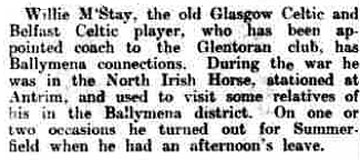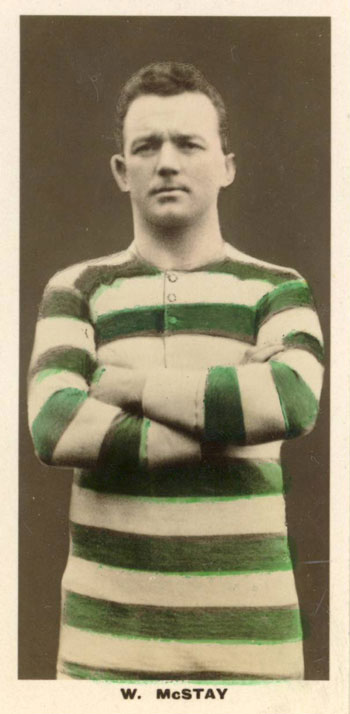Private William McStay
William McStay was born on 21 June 1892 (another source says 21 April 1894) at Netherburn, Lanarkshire, Scotland. He married Elizabeth McArthur in Lesmahagow, Lanarkshire, on 25 September 1914.
By the time of the war McStay was a well-known footballer in the Scottish league. He signed with Celtic from Larkhall Thistle in 1912, spending his first few seasons on loan at Ayr United before finally making his debut for Celtic on 19 August 1916 against St Mirren.
McStay enlisted in the army on 23 February 1916 but was not called-up until the following year, reporting for duty at the North Irish Horse reserve depot at Antrim between 2 and 30 July. His regimental number was either 2623 or 2624 – later Corps of Hussars No 71917.
He remained with the regiment at Antrim for the remainder of the war, playing as a loan signing for both Distillery and Belfast Celtic. He was also permitted to return to Scotland to play for Glasgow Celtic for matches such as the War Fund Shield on 4 May 1918.
McStay was given leave to resume his playing career with Celtic in December 1918, and on 11 January 1919 was discharged as surplus to military requirements (paragraph 392 xxv(a) King's Regulations).
The CelticWiki describes his football career as follows:
There have been few consistently excellent performers in a Celtic shirt as Willie McStay. ... Although his favoured position was at left-back McStay also turned out reguarly as a centre-half and he excelled in both positions. A strong but clean tackler, McStay was an athletic and determined player whose natural strength and keen competitive edge made him a formidable opponent and an ideal team-mate. He was a fearless performer who never ducked out of a challenge but he was also the most sporting of players. When on the field he never gave less than his all. His fitness and stamina were legendary and coupled to his determined attitude and tremendous work ethic was a natural ability on the ball which made him one of the most accomplished defenders in the game.
His Celtic career was interrupted by the First World War and as a soldier McStay turned out as a loan signing for both Distillery and Belfast Celtic. He returned to Parkhead in 1919 but McStay fell out with the club in the immediate wake of their 1923 Scottish Cup triumph when the committee decided that despite the cup success they would cut the players' wages. McStay went AWOL and was suspended by the club. During this period he headed to the United States, and with some US clubs paying the handsome sum of £14 a week to players, Willie made an appearance for the New York Giants. His stay in America was brief and he returned to Glasgow and Celtic in time for the start of the new season. In little over a year would be made captain.
As skipper he inspired his side to a famous 5-0 trouncing of Rangers in the 1925 Scottish Cup semi-final and with so many great attributes it is perhaps unsurprising he went on to become a fine captain both for Celtic and Scotland. As captain McStay guided Celtic to the league championship in 1926 and two Scottish Cup triumphs (1925, 1927). He eventually left the Hoops in the summer of 1929 when he joined Hearts for £250. By then he had made 446 appearances and scored 39 goals. In an interesting twist, he was succeeded as Celtic captain by his brother Jimmy McStay in 1929.
He retired from playing in 1930 and was later manager of Glentoran (Northern Ireland) for a period in the mid-1930s.
As a Celt he won a total of four league titles and three Scottish Cups.

Ballymena Observer, 2 December 1932
McStay was capped for Scotland thirteen times.
He died on 3 September 1960 and was buried in St Conval's Cemetery, Glasgow.



In addition to his brother Jimmy, McStay's great-nephews, Paul and Willie, also played for Celtic, in the 1980s and 1990s.
Images of McStay from football collectors cards in my private collection. Obituary sourced from CelticWiki.

